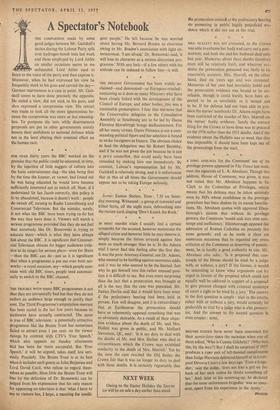IN MOST murder trials I usually feel a certain sympathy
for the accused, however monstrous the alleged crime and however little he may deserve it, simply because the forces arrayed against him seem so much stronger than he is. In the Adams trial I never had this feeling after the first day. It was the poor Attorney-General, not Dr. Adams, who seemed to be battling against enormous odds, and it was he who seemed to be the hunted. Just why he got himself into this rather unusual posi- tion it is difficult to say. But even more surprising than the fact that a prosecution was brought at all is the way that the case was presented. Mr. Justice Devlin said that it would have been wiser if the preliminary hearing had been held in private. Few will disagree, and it is extraordinary that at Eastbourne the prosecution should have so vehemently opposed something that was so obviously desirable. As a result of their objec- tion evidence about the death of Mr. and Mrs. Hullett was given in public, and Mr. Melford Stevenson, QC, said : 'It is my duty to deal with the deaths of Mr. and Mrs. Hullett who died in circumstances which the Crown says exhibited similarity to the death of Mrs. Morrell.' Yet by the time the case reached the Old Bailey the Crown felt that it was no longer its duty to deal with these deaths. It is certainly regrettable that the prosecution insisted at the preliminary hearing on presenting in public highly prejudicial evi- dence which it did not use at the trial.


































 Previous page
Previous page